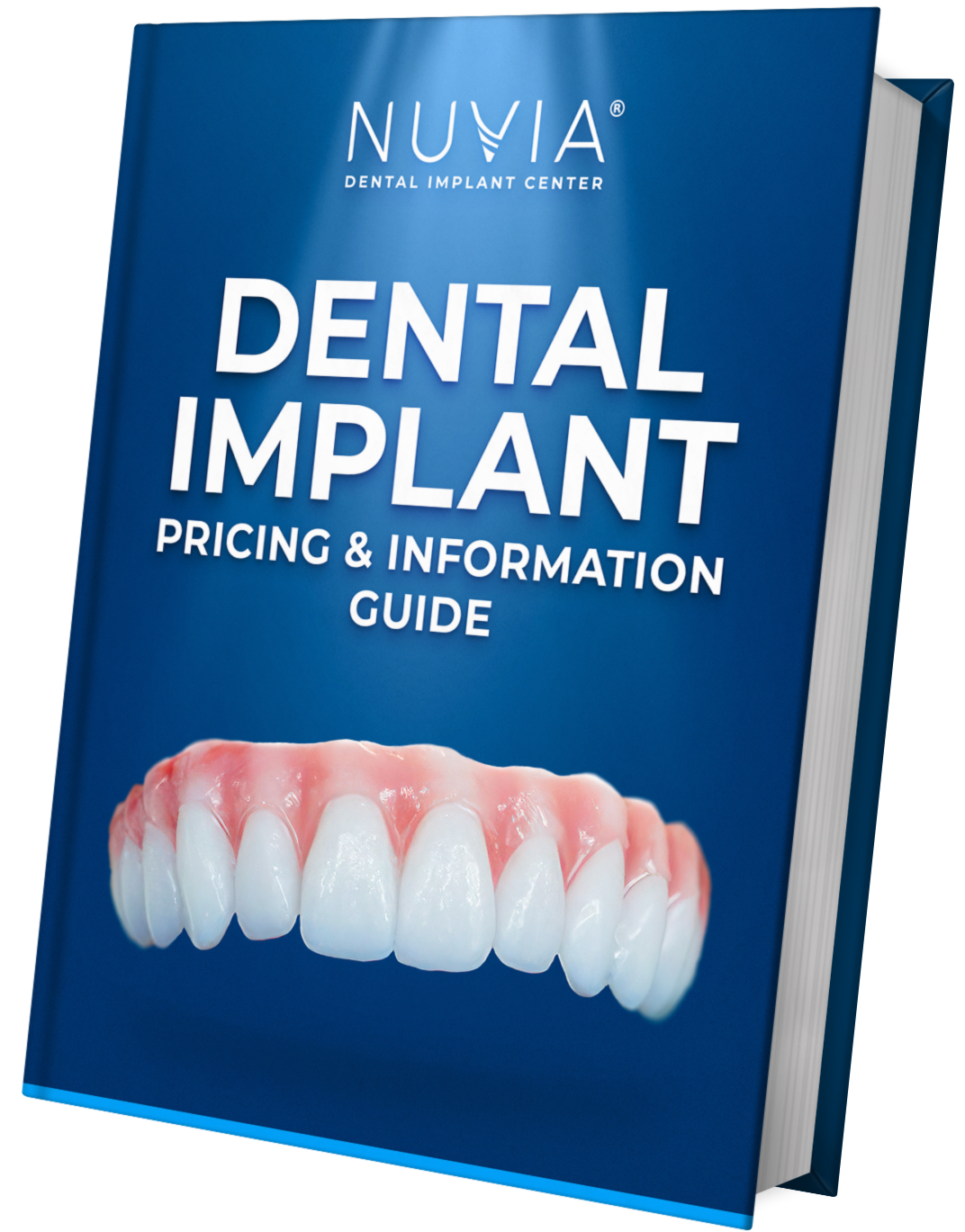
How To Clean Dental Implants.
Find Out If You May Be EligibleFor Permanent Teeth in 24 Hours
Get The Dental Implant Cost Guide

Cleaning dental implants is a necessary step in maintaining good oral hygiene. Keeping these 5 best practices in mind can help you achieve a clean mouth and avoid problems with your dental implants down the road.
#5 BRUSH CORRECTLY.
When people make the decision to invest in dental implants, they fall into the trap of not maintaining them. There are often misconceptions about dental implants in comparison to natural teeth, but It is important to remember to treat your dental implants just as well as you would treat natural teeth. By taking care of your dental implants, you can prevent growth of bacteria, plaque, tartar, and infections. To prevent these things from happening, all you need to do is have a consistent oral hygiene routine.
According to the Mayo Clinic, a proper brushing session should take TWO minutes. That is FOUR minutes each day. By taking this time to brush your dental implants, you can save yourself time that potentially would be spent in a dentist chair getting dental implants repaired.
Picking the right toothbrush for you can make brushing easier. Most dentists will recommend investing in an electric toothbrush, and this can allow for a much deeper clean than manual toothbrushes and can help keep bacteria count lower. Most electric toothbrushes have timers and sensors as well which will help guide you to creating consistently cleaner dental implants.

#4 Not all mouthwash is created the same
Different types of mouthwash can also have varying effects on your gum tissues, and this can have a great impact on your dental implants. Mouthwash containing alcohol, which is commonly used, can have a drying effect on the tissues in your mouth, compromising your saliva's ability to clean your dental implants effectively.
Aside from drying out your gums, alcohol-based mouthwash can also disrupt the natural balance of bacteria in your mouth.
It is so important to remember that some bacteria are harmful and can cause tooth decay and gum disease, others are beneficial and help maintain your oral health. What people often don’t know is that gum disease can occur with dental implants, as well. Alcohol can destroy both harmful and beneficial bacteria, upsetting the balance of your oral microbiome and potentially leading to oral health problems. Try sticking to a non-alcohol based mouthwash and see if this is the right solution for you without jeopardizing your gums and smile.
#3 BRUSH YOUR TONGUE!
Bacteria can live on your tongue as well as on your dental implants, and it is critical that your tongue is a part of your daily oral hygiene routine. Next time you look in the mirror, try sticking out your tongue and giving it a once-over. See those little bumps that make up your taste buds? They're called fungiform papillae, and they're pretty fascinating. But take a closer look and notice how much space there is on your tongue for bacteria to take up residence. It's a veritable bacteria playground! That's why getting a tongue scraper might be a wise move. You can use it before and after brushing your teeth. Giving your tongue a good scrub can help banish tons of bacteria from your mouth and even combat bad breath. So don't forget about your tongue when it comes to your dental hygiene routine!

#2 floss your dental implants
Flossing is an essential part of maintaining good oral health, and it's just as important when you have full mouth dental implants. Flossing helps to remove food particles and plaque from between your gums and implants, where a toothbrush cannot reach.
If left untreated, the buildup of plaque and bacteria can lead to gum disease and implant failure. Flossing can also help to prevent bad breath and keep your gums healthy. It's important to floss regularly, at least once a day, using a floss threader or interdental brush specifically designed for use with dental implants. By flossing daily and practicing good oral hygiene habits, you can help ensure the long-term success of your dental implants and maintain a healthy smile.

#1 Be Consistent
All of these tips can help you if you are consistent. Never miss a brushing session if possible. If it is impossible to brush your teeth, try chewing on a stick of sugar-free gum for 10-15 minutes to clean out bacteria and create saliva to flush out your mouth to hold you over until you can brush. By brushing every area of your mouth and flossing, you can lower the bad bacteria count astronomically. This can aid you in having a brighter, more confident smile that can last for years to come.

More Articles Like This one

Dental Implants Growth Forecasting

Can I Get Dentures For Just My Back Teeth?






